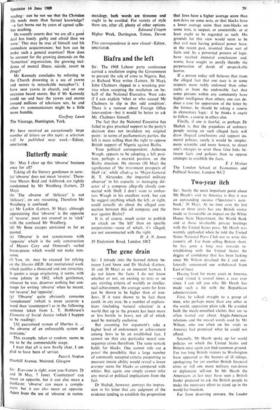The gene drain
Sir: I intrude into the learned debate be- tween Lord Snow and Dr Shahak (Letters, 16 and 30 May) as an innocent layman. I do not know the facts. I do not know whether or not, on existing IQ tests or on any existing criteria of worldly or intellec- tual achievement, the average score for Jews can be shown to be higher than of non- Jews. If it were shown to be fact there could, in any case, be a number of explana- tions (including 'natural selection' in a world that up to the present has been more or less hostile to Jews), not all of which need be mutually exclusive.
But assuming for argument's sake a higher level of endowment or achievement among Jews to be an established fact. I cannot see that any particular moral con- sequence arises therefrom. The same remark holds for blacks. One cannot rule out a priori the possibility that a large number of commonly accepted criteria purporting to measure innate ability would reveal a lower average score for blacks as compared with whites. But, again, one simply cannot infer any moral or political implications from the fact.
Dr Shahak, however, conveys the impres- sion in his letter that any judgment of the evidence tending to establish the proposition that Jews have a higher average score than non-Jews on some tests, or that blacks have a lower average score than non-blacks on some tests, is suspect, or unscientific. or at least ought to be regarded as such. His grounds for this view would seem to be that evil men having political power have. in the recent past, invented these sort of facts and, by a perverted process of logic. have reached immoral conclusions and. worse, have sought to justify thereby the perpetuation of deeds of unspeakable horror.
If a person today still believes that from the alleged fact that one race is in some respects more richly endowed than other races, or from the undeniable fact that some persons within any community have higher intelligence than others, one can de- duce a case for oppression of the latter by the former, he should be taking a course in elementary logic: if he thinks it ought to follow, a course in ethics also.
Finally, if one is fearful, as perhaps Dr Sha'hak is. that the prejudices of ordinary people seizing on such alleged facts will draw illogical conclusions and support im- moral policies, surely it would be simpler, more scientific and more honest, to direct one's energies to sever these false links be- tween facts and policies than to oppose attempts to establish the facts.
E. J. Mishan The London School of Economics and Political Science, London WC2


































 Previous page
Previous page